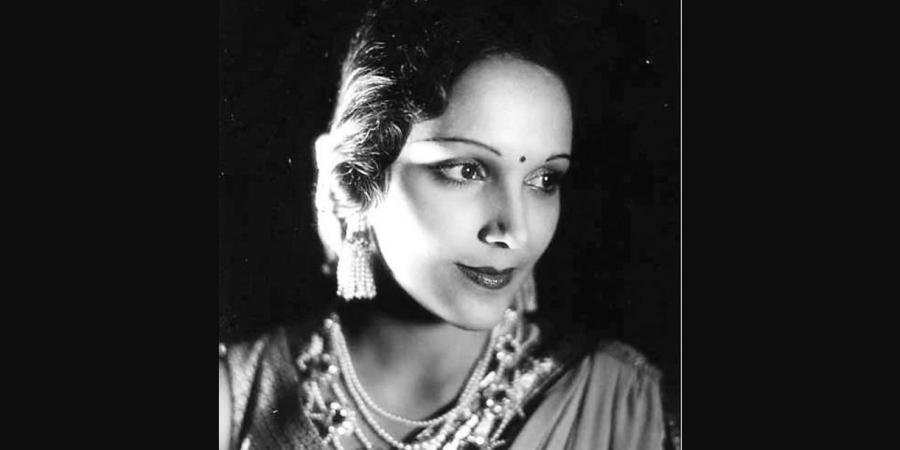Frontlist | Kishwar Rani's book chronicles Devika Rani's role in bollywood
Frontlist | Kishwar Rani's book chronicles Devika Rani's role in bollywoodon Feb 01, 2021

This chronicle brings to the fore Devika Rani’s role as one of the chief architects of the Indian film industry
This formidable book is as much about the life of the film industry in the time Devika Rani occupied it, as it is about her. So, if you are looking for a story that gives you salacious insights into the life of a woman well known among those who know of her, for being bold enough to kiss on screen, this book will disappoint you. It is true that our heroine did lead a life that set her apart from most women of her times; especially women from good families. And there are references to her liaisons during and beyond her marriage, but that is definitely and mercifully, not the crux of this story. What you will find here, instead, is a chronicle that highlights her role as one of the chief architects of the film industry in India, the aspects of her mental makeup and character that motivated her through the many twists and turns in her life, to finally become the first woman to efficiently run a film studio, managing all aspects of filmmaking so as to create good cinema and handle a huge team in the process. Kishwar’s book is the result of arduous research. She admits being stymied by the tonnes of material that she mined over the span of many years. The somewhat history-book quality of writing is perhaps the result. Not that it is a fault, for we get a clean narrative all the same. Perhaps realising the danger of being snowed under by the quantum of material she had to fit into the book, Kishwar has employed the engaging ploy of alternating historical narration with some dramatisation of scenes. It keeps the pace moving crisply. As do the excerpts from the rather effusive letters Devika wrote to her second husband. For example, when writing about the first meeting between the charismatic Himanshu Rai and a teenaged Devika at the home of his friend Niranjan in London, Kishwar tells us of the spark that ignites almost instantly between them: When Himanshu, dapper and sophisticated, lighting a cigarette, says, “I am intrigued by the presence of a beautiful and mysterious woman in Niranjan’s house. It’s rare.” She laughed, looking delighted. Both at being called a woman and at his slightly flirtatious manner of speaking. “I’m here to study architecture. I am staying with Niranjan till I find a place of my own. And in my spare time I work for Elizabeth Arden. I do makeup for old ladies—earn some pocket money.”And so, Himanshu, gallant ladies man, who has wooed and abandoned many a beautiful woman after getting her to invest money in his films, falls victim to Devika’s charms that include her unusual streak of independence. The story goes on to chronicle the wooing of Devika to join films, first to employ her varied artistic talents behind the scenes, then as heroine; and the intense honing of her skills as an actor and manager by Himanshu, now husband and partner. Though there is ample mention of the marriage turning sour and Devika submitting to violence at her mentally disturbed husband’s hands, as well as details about a love affair and an elopement, the author uses these incidents to focus on Devika’s journey through them, and their effect in shaping of her own character as well as the opinions of peers in her studios. Little-known facts about the evolution of what was at that time Bombay’s biggest production house, where now-revered names such as Ashok Kumar, Shashidhar, Gyan Mukherjee and others pitched themselves against Devika to gain control over Bombay Talkies after Himanshu’s death add perspective. So much of almost lost film history comes to light in this book. Making it a valuable backgrounder. The empathy the author shared with her subject is obvious, but one does realise the reason why, despite the obvious patriarchy that exists in the film industry, Devika Rani was awarded the first ever Dada Phalke Award. If there is anything that might strike the reader as a false note, it is the prologue. To me it seemed more like an afterthought, added to hook the casual reader. Focusing on the moment when Devika is poised to marry her secret love—Russian painter Nicholas Roerich—the prologue goes into aspects of their love making, and Devika facing the threat of poison letters from fans, or possibly one of her own directors to whom she has shown ‘special favours’. Far removed from the tone of sincerity in rest of the book, the prologue could either leave the sensation-seeker disappointed, or turn off the serious reader. It almost did that to me.
Devika Rani
Frontlist Book News
Frontlist India news
Indian Author News Frontlist
Indian authors
Indian Film Industry
Kishwar Rani
Upcoming books
Upcoming Books News
Upcoming Books News Frontlist

.jpg)
.jpg)
.jpg)
.jpg)
.jpg)

.jpg)
.jpg)
.jpg)
.jpg)
.jpg)


_(1).jpg)
.jpg)











Sorry! No comment found for this post.